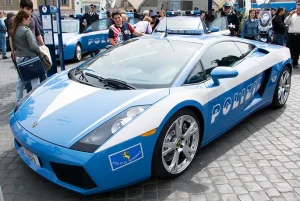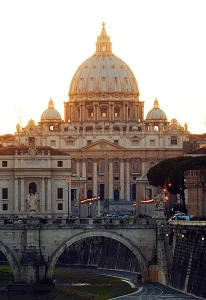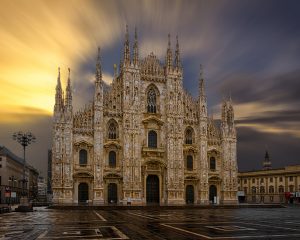Dry umbrellas
Italians do not dry umbrellas unfolded: an open umbrella indoors is an unkind sign. Entering a store, restaurant or office, it is customary to leave wet umbrellas at the entrance – in a special basket, which in dry weather can easily be confused with an urn. Whistling in the apartment is allowed easily, but leaving the bag lying on the bed – God forbid. But, having landed in a bunch of dogs, you should immediately rejoice – this is for the money.
Combing your hair in public for an Italian is the height of indecency, but scratching your balls in front of the whole world is completely normal. Moreover, it should protect from the evil eye.
The weather forecast on TV is not voiced by girls, but by Italian BBC officers in full dress.
The above does not mean that the girl has nothing to do on television. Not at all: she is supposed to shine in the satirical evening program Striscia la Notizia (translated as “Crawling News”). It is assumed that the host pours jokes on the topic of the day, and half-naked beauties bring him “lightning bolts” of news agencies. Walking back and forth across the screen in a bathing suit, you can make an incredible career: get into the leading song contest in San Remo, become a companion of George Clooney, a minister or, at worst, a simple MEP. They get into the statistics for “Crawling News” through a monstrous competition of several thousand candidates for a place – but then everything goes like clockwork: the program airs on the fifth channel, the channel belongs to Berlusconi, and the premier’s penchant for long-legged beauties is known to the whole world, including his ex-wife : Veronica Lario at the time of her acquaintance with the owner of factories, newspapers, ships appeared on stage in skimpy outfits. It is strange that after 20 years, the candidates for the European Parliament recommended by her husband began to surprise her.
Deputies, councillors, ministers, mayors, police chiefs and heads of government in Italy ride metallic blue “lunches”.
There are no flashing lights on them, but the scandals in the press are still hefty: according to official statistics, Italian taxpayers maintain more than 600 government limousines – eight times more than in the States, and ten times more than in France.
The social package of the Catholic hierarch looks very tempting: among other things, cardinals and others like them rely on coupons for special Vatican gas stations (which are found not only in the Vatican itself, but also within Rome).
The boundaries of the Vatican are by no means limited to the Vatican wall. The papal state also includes a country residence in Castel Gandolfo and buildings of various departments, for example, the ministry of Catholic propaganda (Propaganda Fide) in the most touristic quarter of Rome – side by side with the boutiques of Via Condotti.
In addition, seven major Roman basilicas (including St. Peter’s) are considered papal fiefdoms.
Theoretically, in these churches it is still possible to hide from the law no worse than in the time of Caravaggio: the Italian police have no access even to the steps leading to them. Pickpockets use this circumstance with might and main, cutting wallets with cameras from tourists who have grown mad in the queue and providing the Vatican with an incredibly high (worse than the port of Naples) crime rate.
In Rome, on the embankment, a museum of souls in purgatory has been operating for a hundred years.
Italian churches are a treasure for the ethnographer.
Everyone knows about the dilution of the blood of St. Januarius in Naples – but the blood of St. Panteleimon in Ravello does the same (just with a smaller gathering of people). The wooden baby Jesus in the Roman church of Araceli receives letters every year at Christmas; in Sant Eusebio, near the central metropolitan market, animals are blessed on January 17 (they used to bring cows, now they drag terriers and turtles), and in Santa Francesca Romana, at the Forum, vehicles (mostly taxis and motorcycles) are sprinkled with holy water every year on March 9 .
Prayer places in churches
are identified by their golden sheen: in gratitude for the healing (salvation from bankruptcy, finding a groom, resolution from a burden, fulfillment of a wish), the devout public hangs entire chapels with medallions, images of cured limbs made of precious metals, figurines and ribbons. They are especially zealous in the south, in the vicinity of Naples, where any taxi driver, cutting off trucks through a double continuous line, hopes for divine intercession much more than for the police, the courtesy of others and traffic rules.
